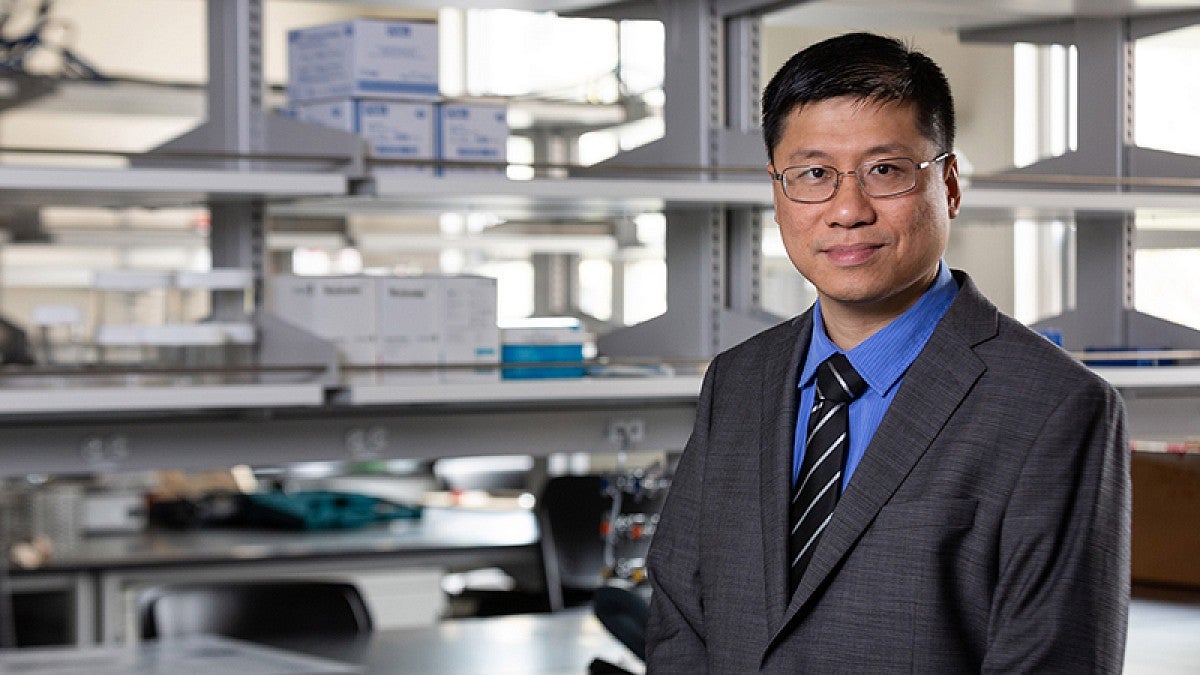Keat Ghee Ong’s innovative spirit and collaborative drive has given rise to multiple companies spun out of his research exploring novel sensors and probes for medical and environmental applications.
His innovation-producing technologies have landed him in the latest class of senior members in the National Academy of Inventors. He is among 63 inventors at 37 research universities, government agencies and nonprofit research institutes named by the academy.
“I feel so fortunate to be recognized as a senior member of the organization,” said Ong, a professor in the Phil and Penny Knight Campus for Accelerating Scientific Impact. “Being a part of a global network of highly talented innovators opens the door to new opportunities and helps me expand my research activities.”
Ong came to the UO in 2019 by way of Michigan Technical University, where he served as a full professor and directed the Biotechnology Research Center and the Life Science and Technology Institute. The campus’ first faculty hire after Robert E. Guldberg, vice president and Robert and Leona DeArmond Executive Director of the Knight Campus, Ong quickly set to work collaborating with other UO faculty members in his research.
“Ghee has made an immediate impact at the UO, setting the tone for later Knight Campus recruits by balancing academic and entrepreneurial efforts with a focus on creating a positive impact on patients and society,” said Jim Deane, associate director of UO’s Innovation Partnership Services. “He is connecting the Knight Campus with other UO research entities, including the Department of Chemistry and the Materials Science Institute, and has actively engaged with campus on commercialization efforts and initiatives.”
Deane also pointed to Ong’s role as a serial entrepreneur who has founded multiple companies to pursue the commercialization of his and other technologies. Those companies include Penderia Technologies, which he founded in 2020 with Guldberg to further develop implantable orthopedic sensors.
Using technology reminiscent of RFID chips used to track lost pets, the sensors are designed to be implanted in suture anchors, screws, or buttons used in surgical repairs to gather crucial information about how patients are healing. The devices could allow doctors or therapists to monitor an individual’s progress and chart a specific recovery exercise plan.
The company is actively pursuing federal Small Business Innovation Research and Small Business Technology Transfer program grants and private investors for the next stage of product development.
Ong’s other entrepreneurial pursuits include the company Norinse Technologies LLC, which he founded in 2007 to implement battery-free wireless sensors to track tools and consumables during surgeries, and Insite Technologies LLC, which commercialized magnetic-based implantable devices based on Ong’s work at Michigan Tech.
Ong received his bachelor’s and master’s degrees and his doctorate in electrical engineering from the University of Kentucky. He has co-authored more than 100 refereed journal articles and four book chapters and mentored five doctoral students and six master’s thesis students. He has secured more than $2.5 million in fundamental research funding and more than $1.5 million in translational and commercialization funding.
Ong is the second faculty member from the Knight Campus to be recognized by the academy. He follows Guldberg, who was named a fellow of the academy, and chemistry professor Darren Johnson, who was also inducted as a senior member.
Onge was nominated for membership in the National Academy of Inventors by the UO’s Innovation Partnership Services office, which works with UO innovators, the public and industry to accelerate the adoption of innovations derived from UO research and education.
Other past UO senior members include biologist Shawn Lockery, chemist Michael Haley and emeritus chemistry professor Jim Remington. Becoming a senior member is a stepping stone to becoming a fellow in the academy. In addition to Guldberg, UO psychology professor Don Tucker and UO emeritus chemistry professor Bruce Branchaud are academy fellows.
—By Lewis Taylor, University Communications


